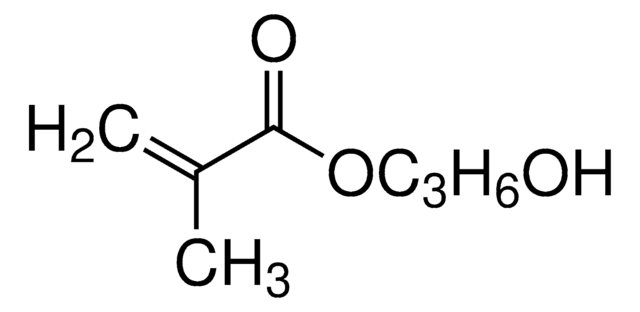128635
2-Hydroxyethyl methacrylate
contains ≤250 ppm monomethyl ether hydroquinone as inhibitor, 97%
Sinónimos:
1,2-Ethanediol mono(2-methylpropenoate), Glycol methacrylate, HEMA
About This Item
Productos recomendados
vapor density
5 (vs air)
vapor pressure
0.01 mmHg ( 25 °C)
assay
97%
form
liquid
contains
≤250 ppm monomethyl ether hydroquinone as inhibitor
refractive index
n20/D 1.453 (lit.)
bp
67 °C/3.5 mmHg (lit.)
density
1.073 g/mL at 25 °C (lit.)
storage temp.
2-8°C
SMILES string
CC(=C)C(=O)OCCO
InChI
1S/C6H10O3/c1-5(2)6(8)9-4-3-7/h7H,1,3-4H2,2H3
InChI key
WOBHKFSMXKNTIM-UHFFFAOYSA-N
¿Está buscando productos similares? Visita Guía de comparación de productos
Categorías relacionadas
General description
Application
signalword
Warning
hcodes
Hazard Classifications
Eye Irrit. 2 - Skin Irrit. 2 - Skin Sens. 1
Storage Class
10 - Combustible liquids
wgk_germany
WGK 1
flash_point_f
222.8 °F - closed cup
flash_point_c
106 °C - closed cup
Certificados de análisis (COA)
Busque Certificados de análisis (COA) introduciendo el número de lote del producto. Los números de lote se encuentran en la etiqueta del producto después de las palabras «Lot» o «Batch»
¿Ya tiene este producto?
Encuentre la documentación para los productos que ha comprado recientemente en la Biblioteca de documentos.
Los clientes también vieron
Artículos
Monomers for ophthalmic use aim for purity, reliability, and comfort, driving innovation for affordable contact lenses.
Nuestro equipo de científicos tiene experiencia en todas las áreas de investigación: Ciencias de la vida, Ciencia de los materiales, Síntesis química, Cromatografía, Analítica y muchas otras.
Póngase en contacto con el Servicio técnico









